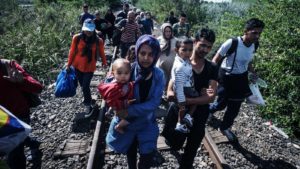Global compact on migration closer
A new global compact on migration is slowly having life breathed into it in a push to help the estimated 244 million migrants around the globe who are not protected by international law.
The first of a series of workshops for UN member states was convened this month to help lay the foundations of a new framework aimed at dealing with one of the world’s most pressing development issues.
The ‘Global Compact for Safe, Orderly and Regular Migration’, set to be adopted in September 2018, is about arriving at an international agreement and policy framework to cover the quarter of a billion people who are on the move.
Director-general of the International Organization (IOM) for Migration William Lacey Swing said the move as about protecting and assisting the world’s migrants.
 “If we can manage things like free movement of capital goods and services, surely we can come up with good terms for the movement of people,” Mr Swing said
“If we can manage things like free movement of capital goods and services, surely we can come up with good terms for the movement of people,” Mr Swing said
“It is not, in the first instance, an issue of funding. It is an issue of trying to sign an agreement on principles and commitments and understandings that would allow us to ensure greater support and assistance for people on the move,” he told media as the workshop got underway.
“These are people who do not qualify as refugees or stateless persons. These are persons from economic migrants, victims of trafficking, persons going to join their families, the sick and the elderly, women with children on the move, all of these categories that are not currently covered,” Mr Swing said.
The IOM-led Global Compact on Migration will lay out principles and commitments that individual governments would use as a guide on cross-border migration coordination.
The framework would not immediately be legally binding, but could influence national policies and international norms.
The two-day workshop at the UN headquarters in New York set out to address issues including the implementation of migration-related Sustainable Development Goals, examine existing approaches governments have to migration and envisage ideas of cooperation to help facilitate safe and orderly migration, IOM said.
One goal would be to decrease the number of migrant deaths each year.
The IOM, which formally joined the UN last year, has documented 65,000 migrant deaths since 2000, and 1,000 so far in 2017. Those numbers don’t reflect additional, undocumented deaths in the Mediterranean Sea and other places.
“It shows our policies are not working. And therefore, it is come to say how can we come together as an international community and say, ‘How can we more responsibly and humanely manage the movement of people?’” Mr Swing said.
The IOM is now leading the consultations on the compact, the idea for which stemmed from the New York Declaration reached at the UN Summit on Refugees and Migrants last September.
A period of formal negotiations on the compact’s text will follow in March 2018, and then countries will agree on the framework in September that year.
“We have limited time but there is enough time to do it,” Swing said.
Meanwhile, other UN officials have urged that dedicated human and financial resources must be made available for persons with disabilities under the new global framework on refugees and migrants.
“We need to be sure that, when world leaders commit to saving the lives of refugees and migrants, to protecting their rights and to sharing responsibility on a global scale, they don’t forget about persons with disabilities,” said Jose Brillantes, the Chair of the UN Committee on the Protection of the Rights of All Migrant Workers and members of Their Families.
“The development and negotiations of the Global Compact for Migration will dominate the migration and refugee policy agenda for the next two years. Persons with disability and their organizations must be included in the design, implementation, monitoring and evaluation of the new framework,” he said.
“This would be truly standing up for the rights of persons with disabilities,” Mr Brillantes said.
Laurie Nowell
AMES Australia Senior Journalist












